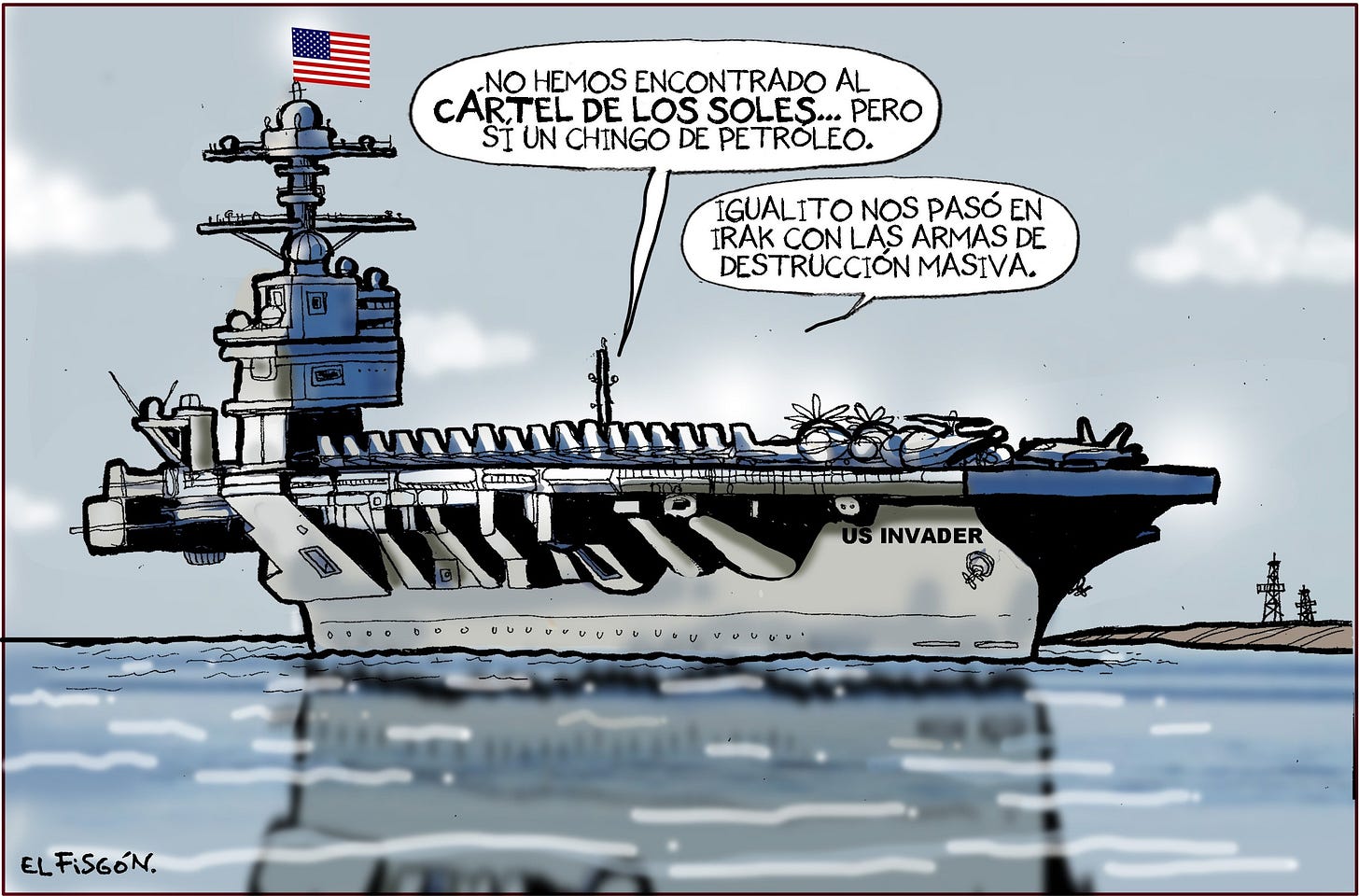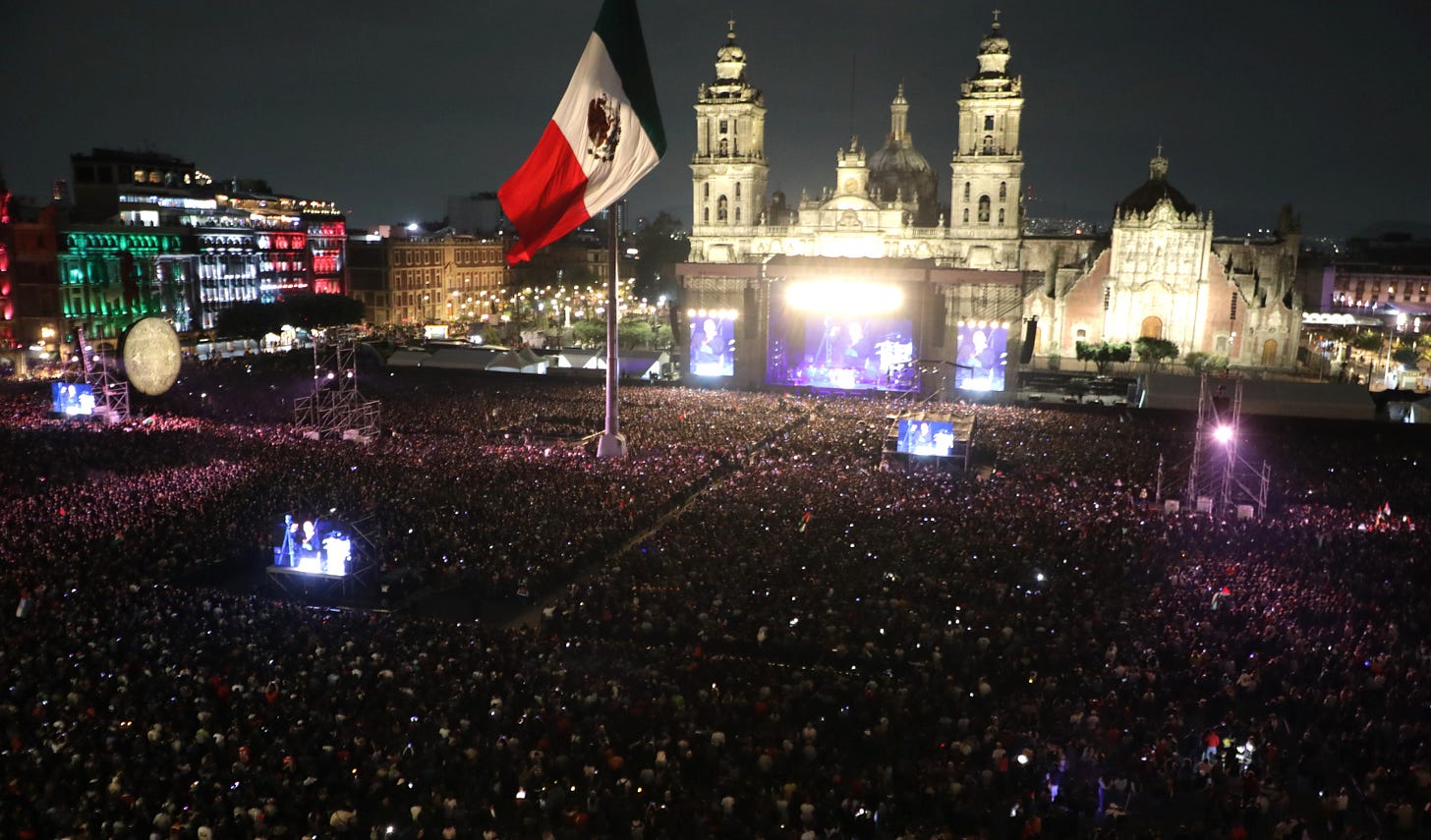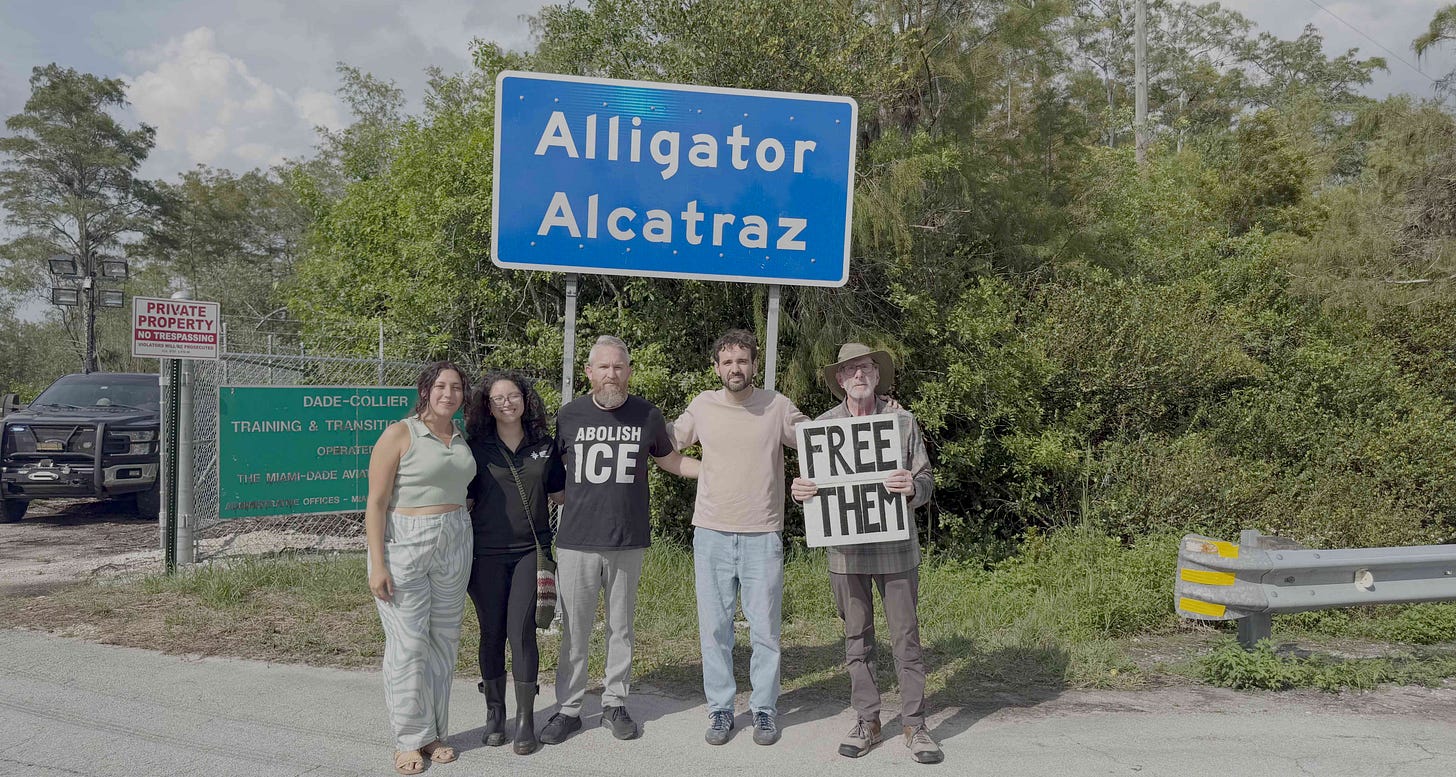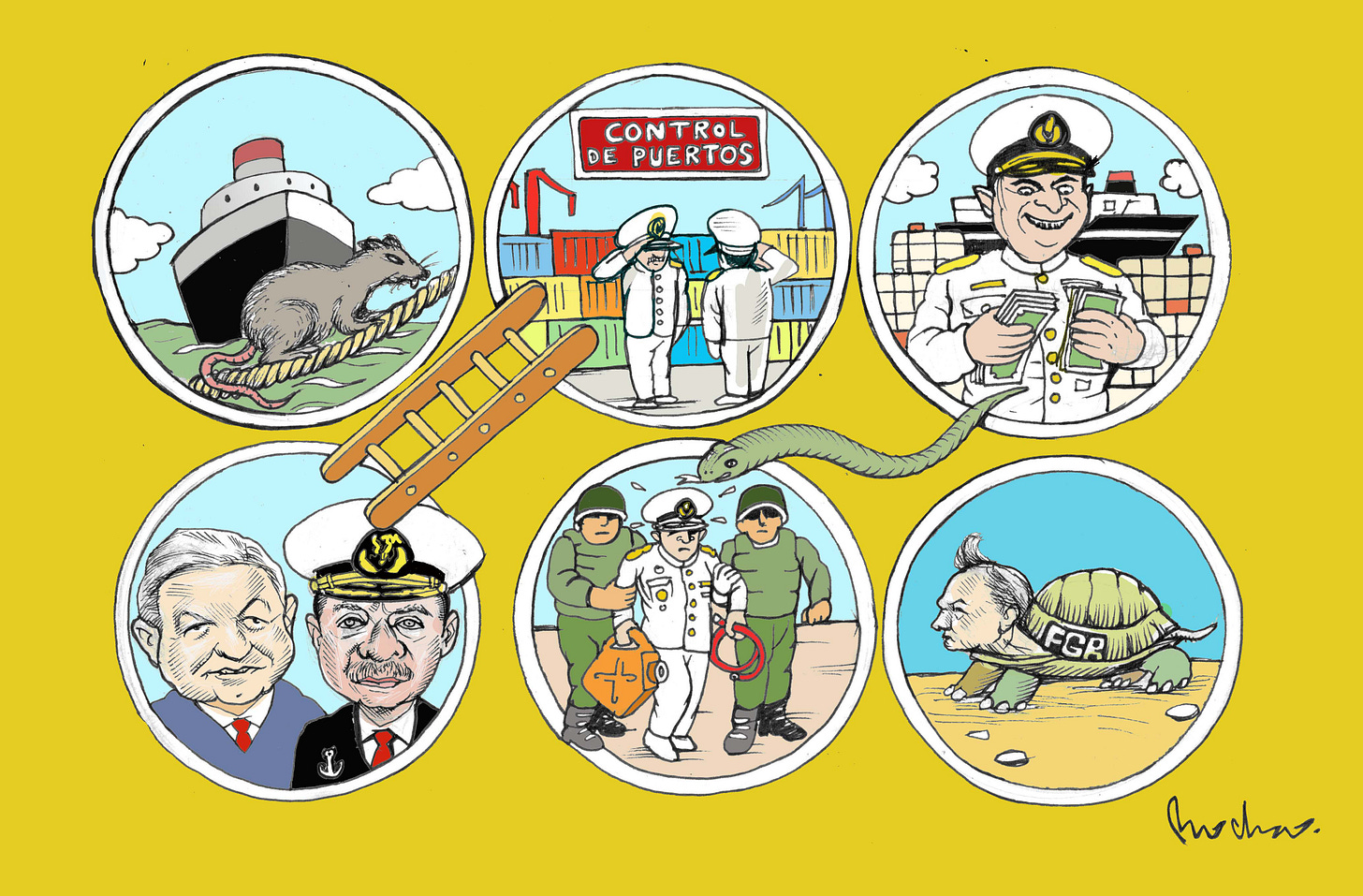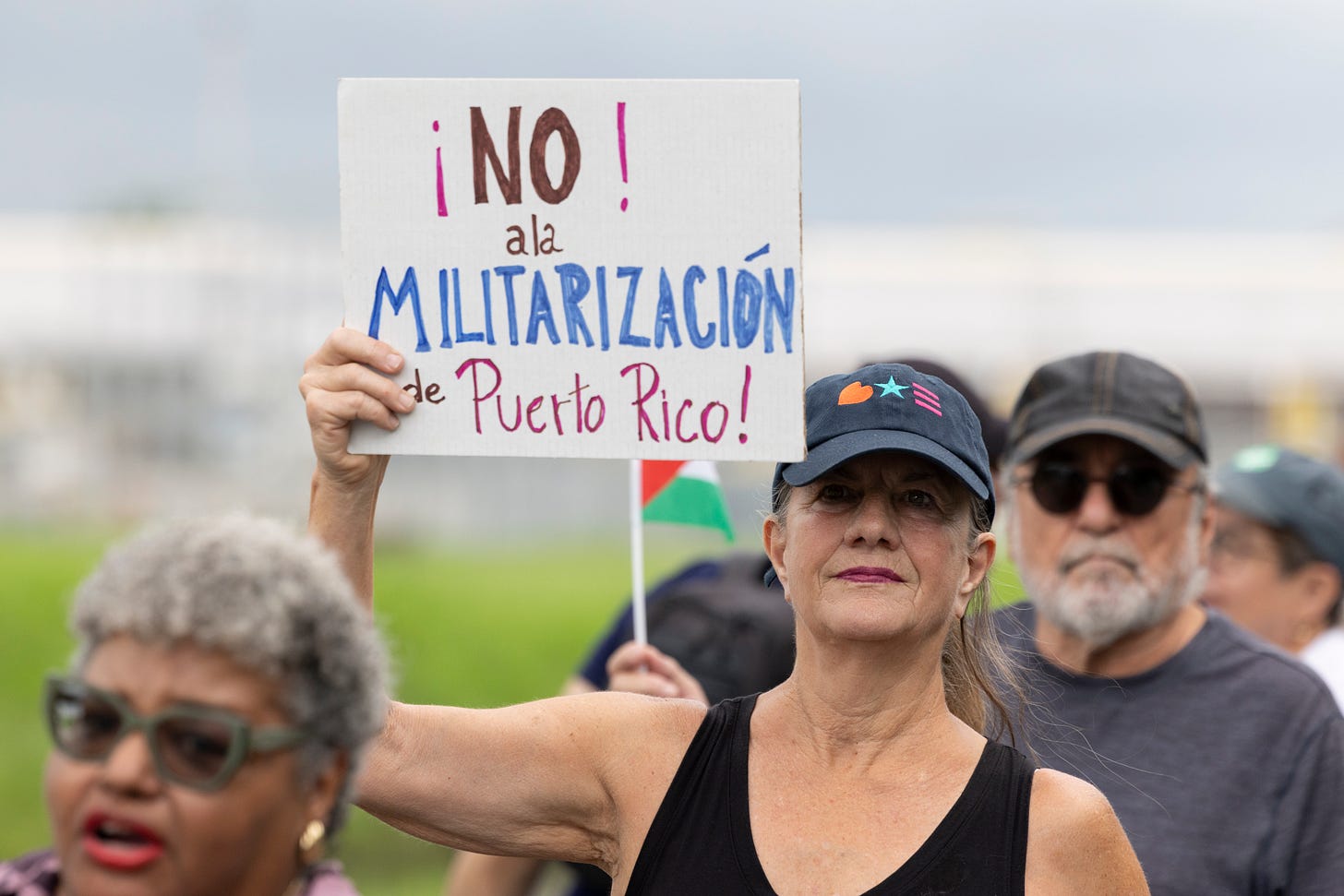The Caribbean: Back to the Future
Also: "The Palestinian struggle is one of the most human”: Residente, in the Zócalo. Immigrants and their allies in the trenches. Sinaloans march for peace. Corruption scandal in the Mexican Navy.
Lea La Jornada Internacional en español aquí.
Signs of a Dying Empire
When the Trump administration blew up a small boat in the Caribbean, killing 11 people on board, it celebrated the attack as a major blow against what it called “narco-terrorism.” With eight warships carrying 4,500 troops and a Marine expeditionary force deployed in the Caribbean to combat U.S. enemies, it suddenly feels like 1898 all over again, complete with the infamous “gunboat diplomacy” once used to bring the Caribbean to heel before the rising superpower.
But this trip back to the future is happening in 2025, a time, as Ángelo Rivero Santos explains, when we are actually witnessing the decline of that very same superpower, one that no longer knows how to respond to challenges to its hegemony and to an international order it no longer controls. Blowing up a motorboat is not a show of strength, but almost the opposite. The killing of 11 unknown individuals, who were not part of any military force, not combatants, and who posed no threat to anyone in international waters, is a violation of international law, and possibly a criminal act, according to La Jornada, as well as U.S. lawmakers, military attorneys, and legal experts.
Former diplomat and professor Rivero Santos points out that the current U.S. military threat against Venezuela is nothing new—though it is a dangerous moment—since Washington, under presidents from both parties, has long sought to derail the “Bolivarian” project of Latin American integration launched by Hugo Chávez and later embraced by his progressive counterparts across the Americas, including the Caribbean. It was Chávez, his allies, and progressive movements throughout the hemisphere who halted the so-called “Washington Consensus” and pushed forward alternative economic, political, and social projects in the region, while also establishing broader relationships with other global powers in an increasingly multipolar world.
The Trump administration’s offensive against Venezuela—and Cuba—is therefore a continuation of Washington’s longstanding rejection of those alternatives. But it comes at a time that marks the end of the Pax Americana in the Americas. That rejection may now be even more dangerous precisely because it is being led by a power that is no longer hegemonic, explained Miguel Tinker Salas and Víctor Silverman. In fact, the Trump administration explicitly rejects the world order it once helped to build, and Secretary of State Marco Rubio, along with Vice President J.D. Vance, openly dismiss multilateral norms, rules, and laws. Rubio declared that “it doesn’t matter what the United Nations thinks” about Washington’s military action against the boat.
Now, both in the region and within the United States, speculation is growing about whether Washington might dare to launch a larger military action to try to force regime change in Venezuela. The justification for the deployment of warships, aircraft, and troops—including the famed Marines, with their long history of interventions in the Caribbean and Latin America—has changed over time: first it was communism during the Cold War, then enemies of “freedom” (meaning free markets and free trade), then drugs and transnational crime, after 9/11 it was “terrorism,” more recently it’s been about being friendly with “adversaries” like China and Russia, and now it’s “narco-terrorism.” Some say this latest “enemy” is the new version of weapons of mass destruction—the pretext for the war in Iraq.
But all of this points both to the decline of a superpower and to a nostalgia for earlier times, including those of the Monroe Doctrine, which poses real danger for the region, especially for countries labeled as “enemies” like Venezuela and Cuba, but also for Brazil and Colombia, who do not bow to U.S. maneuvers. But in reality, the one that may end up most damaged by this offensive is Washington itself.

The Quote:
We should not have to live in a country where the Government can seize anyone who looks Latino, speaks Spanish, and appears to work a low wage job. Rather than stand idly by while our constitutional freedoms are lost, I dissent.
-U.S. Supreme Court Justice Sonia Sotomayor, in her dissenting opinion against the majority decision removing limits on the persecution of immigrants by federal agents.
In case you missed it
◻️ “The Palestinian struggle is one of the most human,” declares Residente from the Zócalo. The rapper and filmmaker, in front of 180,000 people gathered in the Zócalo, brought the Abed family, 18 members in total, on stage. They were the first refugee family to arrive in Mexico after fleeing the Gaza Strip. ▶️ VIDEO
◻️ Roadmap for Sheinbaum’s second year. The Mexican government’s budget, presented in September, makes it clear that next year’s priorities are the poor and those who have been marginalized for decades. However, the budget is severely constrained by slow economic growth, and because at least 30 percent is already committed to covering social security contributions, debt servicing, and outstanding debts from previous years. The proposed taxes on soft drinks and tobacco are, in practice, regressive and harm the poor more than the rich, although they are expected to ultimately improve public health.
◻️ Immigrants and allies on the frontlines; some choose to return. The immigrant defense and resistance movement is active across the United States, confronting Trump’s policies through vigils, grassroots education about legal rights, civil resistance, and music. At the same time, some are choosing to return to their home countries in the face of threats of detention, family separation, and deportation to third countries, writes Jorge Durand.
◻️ "Enough violence, we want peace!" cry residents of Sinaloa. Thousands marched in Culiacán, just two days before the one-year anniversary of the outbreak of an internal war within the Sinaloa cartel, which has unleashed a wave of violence yet to be contained. Following the massive demonstration, President Claudia Sheinbaum stated: “We are working” to bring peace to the state.
◻️ A high-ranking Navy officer and business owners ran a fuel-tax evasion ring. The corruption scandal has implicated nine Navy members, a former federal judge, a former customs official, and several civilians. “Wherever a public official is involved, there will be zero tolerance for corruption,” declared the President. Columnist Enrique Galván Ochoa questions why, if the Attorney General claimed to have received reports of corruption within the Navy two years ago, it took so long to take action.
◻️ Los Carteles Gringos. Leopoldo Santos Ramírez writes about journalist Jesús Esquivel’s new book, and how the rise of fentanyl brought an unprecedented shift in organized crime within U.S. gangs, which have now evolved into full-fledged cartels.
◻️ Anti-colonial rebellion is reborn in Puerto Rico, with a new rhythm. “Since 1952, we haven’t seen this level of participation from progressive forces on this Caribbean island,” says veteran labor organizer José La Luz Díaz in an interview. “There are some emerging forces, made up largely of young people, who are joining the movement.” He adds that one of the surprising elements of this new movement is the role of Bad Bunny, who has embraced the anti-colonial message and brought it to his massive, intergenerational audience.
🎥 What we are watching
Bad Bunny, Tiny Desk Concert




